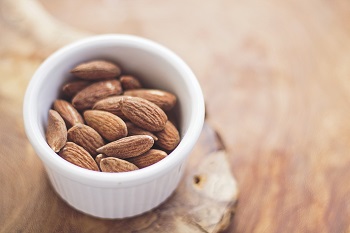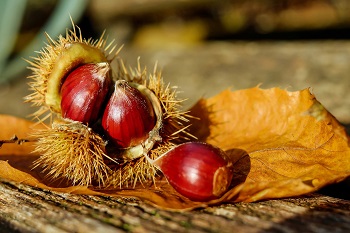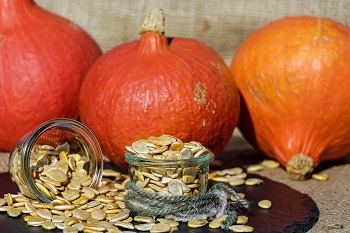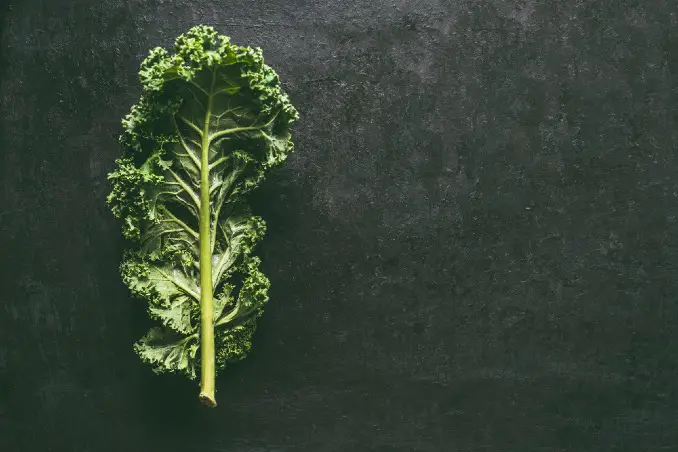This article looks into the question, “which dry fruit is good for the brain?”
Your brain is constantly bombarded from all sides. Stress, environmental toxins, alcohol, lack of exercise, your angry boss… there’s a lot your brain has to deal with.
Eating the right food can help your brain work better. Now, if you asked someone to name you some brain food, they’d probably say fish, eggs, or blueberries.
Dry fruit is unlikely to be the first thing that comes to mind. As it turns out though, dry fruit can boost your mental strength and there’s some solid evidence behind it.
See for yourself:
Almonds
Almonds are packed with vitamin E. This is a nutrient that protects your brain cells from damage.
The way vitamin E protects your brain is by scavenging free radicals. 
These are unstable molecules with just one electron, and they cause oxidative stress in your body – leading to cell damage.
Oxidative stress and inflammation are thought to be one of the main culprits of Alzheimer’s and other terrible brain diseases. (2, 3)
So protecting your brain in any way you can – including eating almonds – could be a good idea.
Brazil Nuts
Brazil nuts are rich in selenium. This is a unique type of antioxidant that does three key things for your brain.
First off, it protects your brain cells from oxidative stress.
Secondly, selenium binds to harmful compounds like mercury, neutralizing them in the process. This helps your body detox more efficiently.
Last but not least, selenium helps your brain cells communicate better by boosting neuron to neuron signaling. (4)
Walnuts
You may have heard of walnuts when looking up brain foods before. Many people say they’re good for your memory and other things. But is this true?
It sure is. Just by looking at them you could tell they’re good for the brain. I mean, a walnut looks like one little brain.
Walnuts not only have vitamin E like its brothers and sisters from the nut family. They also have something called omega-3 fatty acids.
Now, you’ve probably heard of the health benefits of omega-3s before. But just how important these fats are?
Well, let me start by saying that your brain is mostly made of fat. And a good chunk of that fat (around 60% is believed) is DHA, an omega-3 fatty acid. If for no other reason, you should eat more almonds because of their high omega-3s content. (5, 6)
Cashew Nuts
Do you often find yourself in a bad mood? If so, cashew nuts could help.
Cashews are high in l-tryptophan, which is an amino acid that your brain uses to make serotonin.
Now, you may have heard of serotonin before. It’s your brain’s ‘happiness’ molecule. And it controls plenty of other bodily functions, including movement, appetite, and sleep.
Serotonin is essentially an anti-depressant neurotransmitter. It’s so important that a deficiency in it is linked to depressive symptoms and lethargy. (7)
Chestnut
Chestnuts are delightful autumn food. They don’t just taste, look, and smell great when you roast them, it turns out they also have B vitamins.
In particular, they have vitamins B1, B2, B6, and B9.
All of these play a role in your brain health, some more some less. B9, also known as folic acid (or folate), is the one you’ll probably be most interested in.
See, it helps you get rid of excess homocysteine. Now, homocysteine is usually a harmless amino acid; it’s a byproduct of red meat. But too much of anything is typically not good, and the same goes for homocysteine.
What happens when you have high homocysteine is that your blood vessels can become ‘sticky.’ Plaque can build up within the artery walls, which leads to trouble. For example, if plaque disrupts healthy blood flow in small capillaries in your brain, that could potentially lead to cognitive issues and other problems.
That’s why getting enough B vitamins, particularly vitamin B9, is critical. They help keep homocysteine at bay – preventing it from rising too high. And chestnuts, as we said, are a great source of this crucial vitamin. (8, 9)
Cantaloupe Seeds
Cantaloupe or mush melons are a popular and refreshing fruit. They’re great to eat in summer because of their high water content and juicy, delightful flavor. Of course, they aren’t dry fruit, so we are going to talk about them some other time.
But cantaloupe seeds, which are found in cantaloupe (who would’ve guessed??), are considered dry fruit. And they’re particularly good for your brain. They have a variety of nutrients, including vitamins A, C, and E stand out.
Vitamin C is a water-soluble antioxidant that protects your cells from oxidative stress. Your brain also needs it for many other things, such as the creation of myelin sheath which insulates your nerves and acts as a conductor for transmitting brain cell signals. (10)
Now, in addition to these natural vitamins, cantaloupe seeds also have fiber. Fiber is key to a healthy gut, but also a healthy brain.
How, you ask?
Well, it all starts with the vagus nerve. See, this is a nerve that extends from your gut all the way to your brain. The ‘gut-brain connection.’
In fact, the bacteria in your gut produce the bulk of your serotonin. So by nourishing these good bacteria with fiber, you help your brain work better too. (12)
Figs
Figs contain potassium. It’s an electrolyte, much like magnesium, sodium, or calcium. All of these are food for not just your brain (being essential for the transmission of nerve signals) but are also food for your adrenal glands. (11)
Your adrenal glands are essential for producing hormones such as adrenaline and cortisol, along with regulating other bodily functions. In order for you to feel good mentally and perform at your best, your adrenal glands need to work optimally too. When they get out of whack, your thinking gets out of whack too – leading to brain fog, mental fatigue, and so on.
That brings us back to potassium, which, as we said, nourishes both your brain and your adrenals.
Apricots
Apricots have plenty of vitamin A and C. As we repeated, these two nutrients are potent antioxidants that prevent free radicals from accumulating in your brain. While vitamin C is a water-soluble antioxidant, vitamin A is a fat-soluble one. They work in tandem to protect your brain cells from the ravages of aging. One additional benefit of vitamin A is that it also helps you maintain neuronal plasticity and optimal cognition. (13)
Pistachios
Pistachios are another great dietary source of vitamin E. This dry fruit bolsters your body’s native antioxidant defenses. In turn, this helps the body get rid of damaging and unstable cells. (14)
Pumpkin Seeds
According to Healthline, Pumpkin seeds contain several nutrients that play a role in brain health. (1)
These include magnesium, iron, copper, and zinc. While some protect your neurons from free radicals, others provide raw materials for your brain cells to communicate efficiently.
Here’s what each of these nutrients does to your brain:
- Magnesium – essential for nerve health, memory, and mood. Deficiency can easily make you irritable, as well as leading to poor memory and migraines.
- Zinc – allows your neurons to fire signals to each other fast.
- Copper – plays a role in brain cell communication.
- Iron – Low iron levels often lead to brain fog and overall reduced brain function.
Wrapping up – Final Thoughts
So these were ten best dry fruit for your brain. It turns out, eating fish and eggs isn’t the only way to nurture your mind. If you’re on a plant-based diet, some of these foods could be a perfect addition to your meal plan. They’ll give your brain the nutrients it needs – including zinc, vitamin E, magnesium, copper, and others.
Ultimately, it all comes down to a healthy and balanced lifestyle. If you aren’t paying attention to what you eat, how often you train, and how well you sleep, one single food won’t help you achieve your goals. Combining what you saw here with a balanced lifestyle is the key to a fitter and happier mind.
Which dry fruit is good for the brain References
- 11 Best Foods to Boost Your Brain and Memory. (source)
- Effects of Vitamin E on Cognitive Performance during Ageing and in Alzheimer’s Disease. (source)
- Oxidative stress in brain aging. Implications for therapeutics of neurodegenerative diseases. (source)
- Importance of selenium and selenoprotein for brain function: From antioxidant protection to neuronal signaling. (source)
- Docosahexaenoic acid (DHA): An essential nutrient and a nutraceutical for brain health and diseases. (source)
- DHA. (source)
- The Effects of Dietary Tryptophan on Affective Disorders. (source)
- The relationship between homocysteine level and vitamins B12, B9 and B6 status in patients with chronic kidney disease. (source)
- What Are the Benefits of Roasted Chestnuts? (source)
- Vitamin C Status and Cognitive Function: A Systematic Review. (source)
- The increased potassium intake improves cognitive performance and attenuates histopathological markers in a model of Alzheimer’s disease. (source)
- The Brain-Gut-Microbiome Axis. (source)
- Significance of vitamin A to brain function, behavior and learning. (source)
- Pistachio supplementation attenuates motor and cognition impairments induced by cisplatin or vincristine in rats. (source)



